Putin is humiliated during annual press conference as Russians’ texts asking questions such as ‘why is your reality at odds with ours?’ and ‘when will the real Russia be the same as the one on TV?’ appear on screen
Vladimir Putin faced humiliation today during his year-end press conference as questions about Russia's “reality” appeared on screens.
The Russian president is currently speaking in Moscow, giving ordinary people a chance to ask questions, along with questions from journalists.
Citizens have been asking Putin questions for two weeks. State media said around 2 million questions had been sent to Putin on Wednesday.
It also emerged that questions were submitted in text form via SMS, and although Putin did not answer them directly, they flashed on the screens on the walls in the hall where the Russian despot spoke.
However, not all of these messages were in line with the overall message of the heavily choreographed, which is more about spectacle than control.
'Why is your 'reality' in conflict with our lived reality?' a message displayed on screens in the room asked the Russian president.
Questions about Russia's 'reality' were displayed today at Vladimir Putin's year-end press conference as a humiliation for the Kremlin
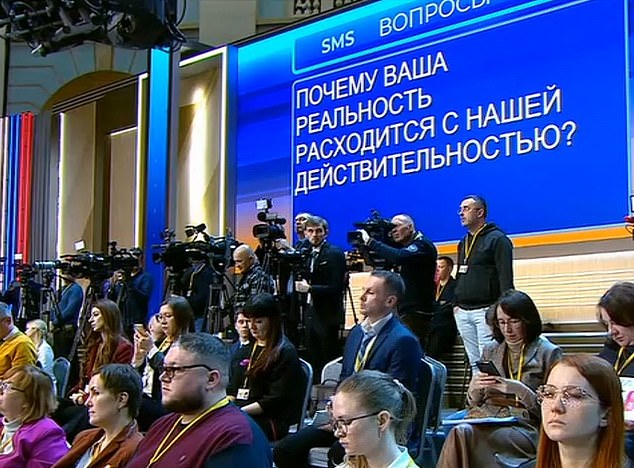
'Why is your 'reality' in conflict with our lived reality?' this message, which was shown on the screens in the room, asked the Russian president during his annual press conference
Another question asked, “When will the real Russia be the same as the one on TV?”, and another asked, albeit politely, “Hello. When will it be possible to move to the Russia they tell us about on Channel One?'
Putin's tactics in Ukraine were also questioned by one report.
“Can you win a war while in 'active defense'?” the message asked.
Another drew attention to the rising prices of groceries in Russia.
'Cucumbers cost 900 rubles per kilo, tomatoes 950 rubles. It costs me 1500 rubles to make a salad. I won't even mention the fruit. Make prices normal!'
Several other questions on the screens focused on gas and its rising costs, while one specifically targeted Russian state energy company Gazprom.
'We gave gas to China, we gave gas to Europe. When will there be gas in Khakassia?' there was a message asking about the Russian region of Southern Siberia.
Another asked angrily: 'How long will corruption at Gazprom be tolerated? In the spring, LPG (liquid petroleum gas) cost R16/litre. Now 34P. How did the price increase by 200%? Why is there a shortage in the country and caravans going to the West?'
'Hello! Why is the gas price rising in Novosibirsk? And the price of petrol isn't falling?' another question put to Putin was asked.
Even as Putin walked into the hall to enthusiastic applause, a message appeared behind him saying: “We live almost without electricity, our calls have not changed anything, the only hope left lies in you.”
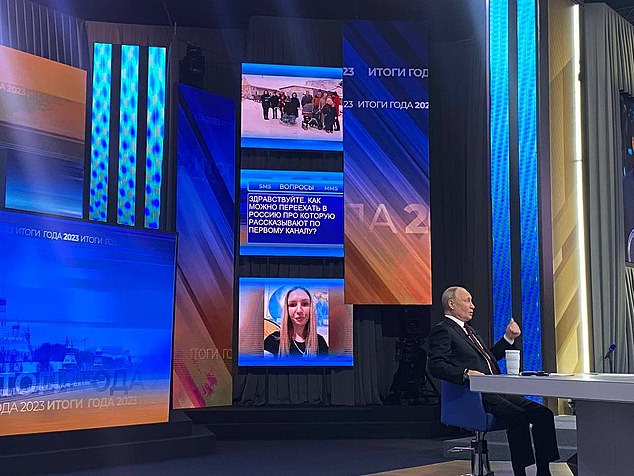
This question, which appeared on a screen behind Putin, read: “Hello. When will it be possible to move to the Russia they tell us about on Channel One?'
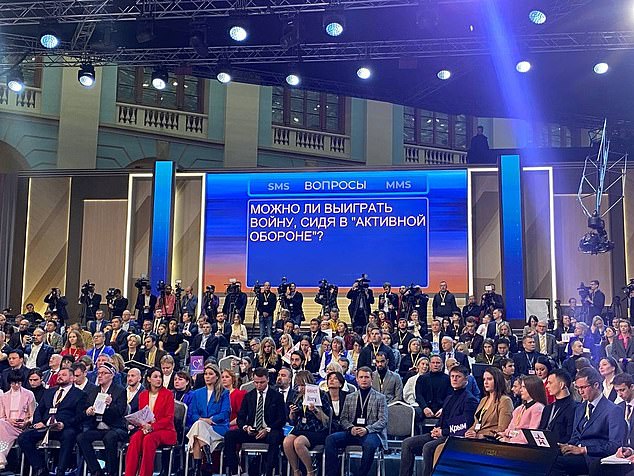
This question was asked about the war in Ukraine: “Can you win a war while in 'active defense'?”
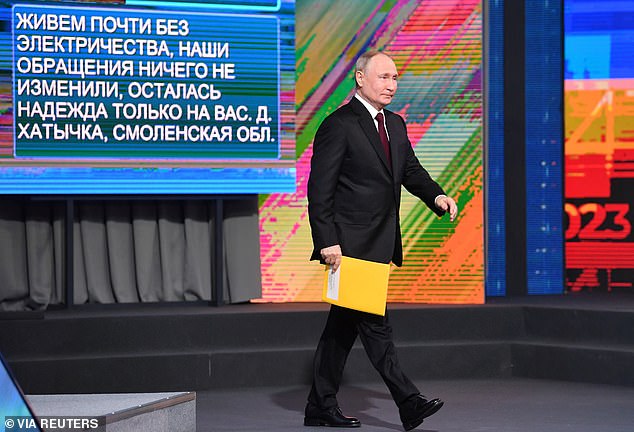
Even as Putin walked into the hall to enthusiastic applause, a message appeared behind him saying: “We live almost without electricity, our calls have not changed anything, the only hope left lies in you” (photo)
Putin seemed unimpressed by the reports and did not respond to them.
Instead, he spoke about his continued invasion and said Moscow's goals – “de-Nazification, demilitarization and a neutral status” of Ukraine – remain unchanged.
He formulated these objectives on the day he sent troops to Ukraine in February 2022.
“De-Nazification” refers to Russia's accusations that the Ukrainian government is heavily influenced by radical nationalist and neo-Nazi groups. The claim is ridiculed by Ukraine and the West.
Putin has also demanded that Ukraine remain neutral – and not join the NATO alliance. “There will be peace if we achieve our goals,” Putin said.
The Kremlin has since said repeatedly that the “special military operation” in Ukraine will continue until these loosely defined goals are achieved.
Giving rare details about the Moscow operation, Putin said some 244,000 troops called up to fight in Ukraine were currently on the battlefield. He rejected the need for a second wave of reservist mobilization.
He did not provide a total for the number of troops in Ukraine, where professional Russian forces are also fighting.
In September 2022, Putin ordered a partial military call as he tried to strengthen his forces in Ukraine, sparking protests.
“There is no need to weaken now,” Putin said, because 1,500 men are being recruited into the Russian army every day across the country. He said a total of 486,000 soldiers had signed contracts with the Russian army on Wednesday evening.
In addition to the fighting in Ukraine, the economy and social services are also expected to be discussed at the press conference, Russian state journalists said.
Last year, Putin did not hold his usual call-in show with ordinary Russians or his traditional session with reporters.
In addition, his annual state of the nation address was postponed until February this year. His last press conference was in 2021, amid US warnings that Russia was about to send troops to Ukraine.
With the future of Western aid to Ukraine in doubt and another winter of fighting looming, neither side has been able to make significant gains on the battlefield in recent times.
Ukrainian President Volodymyr Zelensky traveled to Washington on Tuesday and made an impassioned plea for more US aid and weapons.
Putin's appearance is aimed primarily at a domestic audience and will be an opportunity for him to personally solve the problems of ordinary Russian citizens and strengthen his grip on power ahead of the March 17 elections.
But it is the first time that Putin, who has sharply limited his interaction with foreign media, has faced multiple questions from Western journalists since the fighting in Ukraine began on February 24, 2022.
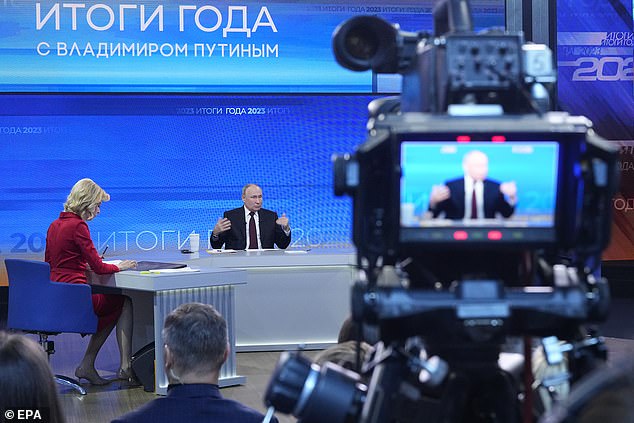
Russian President Vladimir Putin (center) answers questions during his annual press conference with Russian federal, regional and foreign media in the Gostiny Dvor forum hall
“For the majority of people, this is their only hope and possibility to solve the most important problems,” said a state television news report on the Russia 1 channel.
In 2021, Putin called a citizen asking about water quality in the city of Pskov in western Russia and personally assured him that he would order the government and local officials to solve the problem.
Some Russian journalists, who queued for hours in freezing temperatures to enter the venue, have donned traditional clothing, including elaborate hats, to attract Putin's attention.
Many journalists also hold posters, prompting the Kremlin to limit the size of signs they can carry during the press conference, which often lasts about four hours.
